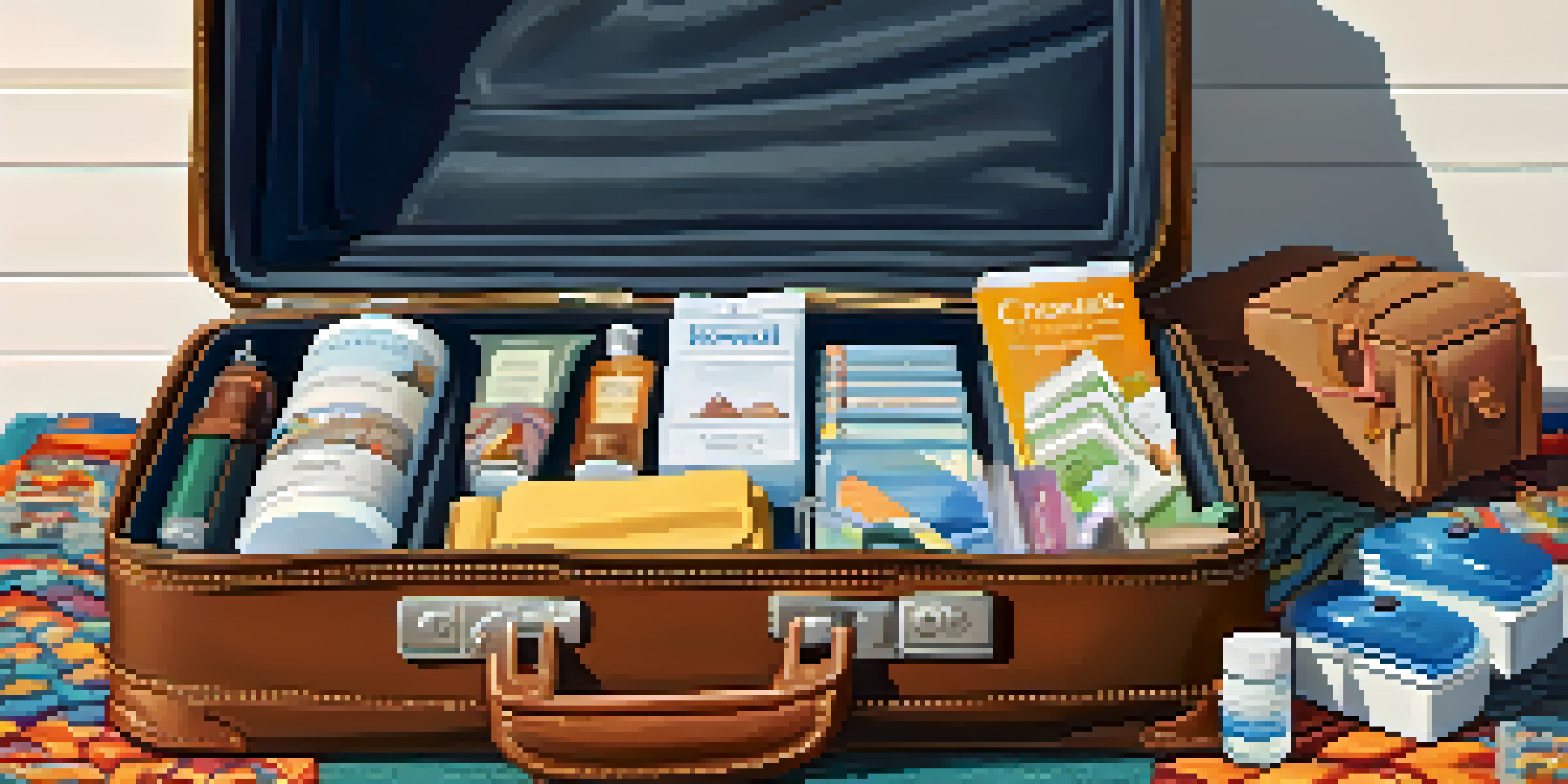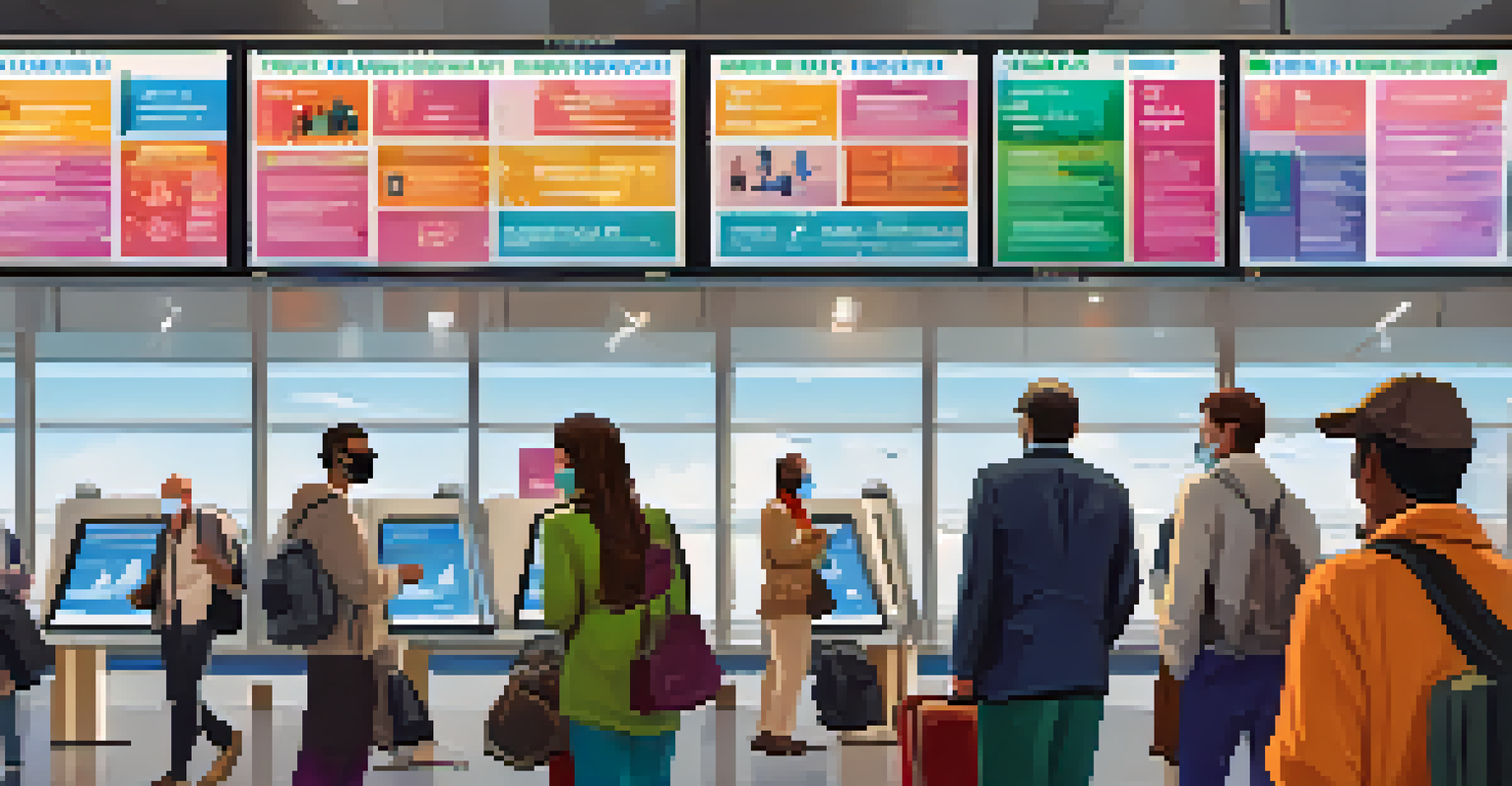Traveling During a Pandemic: Health Precautions to Take

Understanding the Risks of Travel During a Pandemic
Traveling during a pandemic can feel like walking a tightrope. While the urge to explore new places is strong, it's essential to acknowledge the risks involved. The virus can spread easily, especially in crowded spaces like airports and public transport.
Traveling – it leaves you speechless, then turns you into a storyteller.
Being aware of these risks helps you make informed decisions about your travel plans. Consider how local infection rates may impact your safety and that of others. This understanding is crucial for preparing adequately before you set off.
Ultimately, knowledge is power. By staying informed about the current situation and guidelines from health authorities, you can better navigate your travel experience and protect both yourself and those around you.
Checking Travel Advisories and Restrictions
Before you pack your bags, it’s important to check travel advisories. Many countries have specific guidelines or restrictions in place that could affect your trip. This may include quarantine requirements or limitations on entry.

Websites from health organizations or government travel departments are great resources for this information. They provide the latest updates, allowing you to adjust your plans accordingly. Ignoring these advisories can lead to unexpected complications during your travels.
Understand Travel Risks
Being aware of pandemic-related travel risks helps you make informed decisions and prepare adequately.
In essence, staying updated not only ensures compliance but also enhances your safety. Knowing what to expect at your destination will help you prepare mentally and logistically for your journey.
Packing Essential Health Supplies
When it comes to packing for travel during a pandemic, think beyond your usual essentials. Make a checklist of health supplies that can help keep you safe, such as masks, hand sanitizers, and disinfecting wipes. These items will be your first line of defense against germs.
The journey of a thousand miles begins with one step.
Consider packing extra supplies, just in case your travels extend longer than expected. Having more than you need will give you peace of mind and ensure you're prepared for any situation. After all, a healthy traveler is a happy traveler.
Incorporating these health supplies into your packing routine not only safeguards your well-being but also shows others you take health seriously. It sets a positive example and encourages those around you to follow suit.
Practicing Good Hygiene While Traveling
Good hygiene practices are crucial when traveling, especially during a pandemic. Regular hand washing and using hand sanitizer can significantly reduce your risk of infection. Make it a habit to clean your hands after touching surfaces in public areas.
Additionally, wearing a mask in crowded places is a simple yet effective way to protect yourself and others. Even if you feel healthy, it’s important to remember that not everyone may be symptom-free. Your actions can contribute to the overall health of the community.
Check Advisories Before Traveling
Staying updated on travel advisories ensures compliance with local guidelines and enhances your safety.
By adopting these hygiene practices, you not only safeguard your own health but also create a safer environment for fellow travelers. It's a small effort with a big impact.
Maintaining Social Distancing While Traveling
Social distancing might feel challenging while traveling, but it’s essential for minimizing exposure. Whenever possible, keep a safe distance from others, especially in crowded spaces like airports or train stations. This can greatly reduce the likelihood of transmission.
Consider choosing less crowded travel times or opting for outdoor activities where distancing is easier. This not only keeps you safe but can also enhance your travel experience by allowing you to enjoy nature and fresh air.
Remember, maintaining social distance isn't just about protecting yourself; it’s about ensuring the safety of everyone around you. A little space can go a long way in preventing the spread of illness.
Being Aware of Symptoms and Testing
Staying vigilant about your health is paramount when traveling during a pandemic. Be aware of any symptoms associated with the virus, such as a cough, fever, or loss of taste. If you start to feel unwell, it's best to seek medical attention immediately.
In addition, consider getting tested before and after your trip. Many places require proof of a negative test result for entry, and it can provide peace of mind for both you and others. Testing helps identify potential risks, allowing for quicker responses if necessary.
Prioritize Health Supplies and Hygiene
Packing essential health supplies and practicing good hygiene are key to safeguarding your well-being while traveling.
Ultimately, being proactive about your health reinforces a culture of safety. It encourages others to do the same, making everyone feel more secure during their travels.
Knowing When to Cancel or Postpone Travel Plans
Sometimes, the best decision is to postpone your travel plans. If you or someone in your travel group feels unwell or if local conditions worsen, it’s wise to reconsider your trip. Staying flexible and prioritizing health is essential.
Moreover, many airlines and hotels have adjusted their cancellation policies due to the pandemic. Familiarize yourself with these options so you can make changes without severe penalties. This knowledge allows you to plan with confidence.

In the end, your health and safety should always come first. It’s better to wait for the right time to travel than to risk your well-being or that of others.